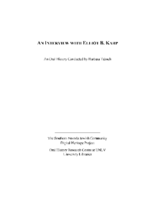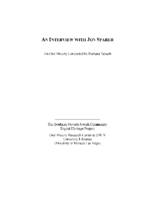Search the Special Collections and Archives Portal
Search Results
Deacon, James E.
James Deacon was born at home in White, South Dakota. For the first few years of his life, the family moved around a lot to accommodate his father's job as school superintendent. Their summers were spent in a cabin on a lake, where Jim helped his grandparents in their store, seining minnows, clerking, and storing ice. From his eighth grade year through high school graduation, the family lived in Aberdeen, South Dakota.
Person
Sabbath, Roberta Sterman
Roberta Sabbath was born on December 23, 1943 in Richmond, Virginia. She received her bachelor's degree in French Studies from the University of Maryland, College Park in 1965 and married Dennis Sabbath in 1967. The couple spent two years in Chicago, Illinois before moving to Kodiak, Alaska in 1969 where she started an adult basic education program and a youth program. After about two years in Alaska, Sabbath and her husband moved to Las Vegas, Nevada.
Person
Tom and Erma Godbey Photograph Collection
Identifier
Abstract
The Tom and Erma Godbey Photograph Collection is comprised of thirteen black-and-white photographic prints and negatives from 1934 to 1944. The photographs depict the Godbey family participating in parades and other events in Boulder City, Nevada and Las Vegas, Nevada.
Archival Collection
Las Vegas African American Community Conversations round table interviews
Identifier
Abstract
The Las Vegas African American Community Conversations is a four-part conversation with local Las Vegans. The first part of the round table is moderated by Trisha Geran with a central theme of "Migration, Work and Community Emergence." The panelists discuss the early history of the African American community in Las Vegas, Nevada. They also discuss how and why their families moved to Las Vegas, most citing the economic opportunities as a major factor. The participants share their personal histories and family histories building up the African American community in downtown Las Vegas and the Westside. The second part of the round table is moderated by Sonya Horsford with a central theme of "Education, Economy, and Integration." The panelists discuss the Clark County School District pre- and post-integration. They discuss the hardships of the Sixth Grade Center Integration Plan on the African American community as well as discussing the differences in the school facilities. The round table participants also discuss the social services and social programs and the history of those programs from the African American perspective. They also discuss civic involvement and the various civic groups started by the panelists, and share discrimination they faced.
The third part of the round table is moderated by Claytee D. White with a central theme of "Civil Rights and Entertainment." The panelists discuss the racism and segregation present in Las Vegas and discuss how African American community leaders worked to integrate African Americans into the Las Vegas community. They discuss the 1969 riots in detail, and discuss African American entertainers and the entertainment industry. They share personal experiences working in the entertainment industry and discuss the importance of the local unions, such as the Culinary Workers Union Local 226, the International Alliance of Theatrical Stage Employees Local 720, and their contributions to the unions. The fourth and final part of the round table is moderated by Rachel Anderson with a central theme of the "Early African American Legal Community." The panelists discuss the foundations of the professional legal community in Las Vegas, noting the contributions of Charles Keller, Dr. William Bailey, and the Reverend Marion Bennett as driving forces for civil rights activism in Las Vegas. They share their experiences growing up in Las Vegas facing discrimination and segregation. Lastly, they share the changes they have seen and how both the legal and African African communities have grown.
Archival Collection

Transcript of interview with Elliot B. Karp by Barbara Tabach, December 17, 2014
Date
Archival Collection
Description
Interview with Elliot B. Karp by Barbara Tabach on December 17, 2014. In this interview, Elliot Karp discusses growing up in a culturally Jewish household in New York and becoming more observant in his teenage and college years. He decided, after a trip to Israel and a year in a rabbinical program, that he wanted to be a "Jewish professional" with a focus on social work and community organizing, and attended a Master's program at Brandeis University. Karp goes on to talk about his work for the Jewish Federation in Ohio and Pennsylvania, and being recruited to come to Las Vegas. He talks about the challenges in the Las Vegas Jewish community and the Jewish Federation's role as an umbrella organization to partner with other agencies to grow and sustain a robust Jewish community in Southern Nevada.
On October 6, 1955, Elliot Karp was born in Mineola, New York to parents of East European heritage who identified as culturally Jewish. As a teenager, Elliot felt the calling to become kosher, balancing this practice with household norms that were not as strict. He eventually became shomer Shabbat just after enrolling at State University of New York at Stony Brook, where he majored in Political Science. After graduating from SUNY, Elliot spent a year living in Israel considering a path in rabbinical studies. By the end of his time, he decided on a different, yet related path, and registered as a graduate student in Brandeis University's School of Jewish Communal Service, on fellowship from Council of Jewish Federations. After graduating, Elliot moved to Columbus, Ohio to work for the Jewish Federation, focusing on fundraising, but was exposed to many different operational areas of the organization. After three years, Elliot was recruited to the Philadelphia office as its director of leadership development. He then left the Federation to work in development at Brandeis University, but after two years, returned to the Federation as the Cincinnati office's chief development officer. In 2008, Elliot received a call to take his highly cultivated leadership and fundraising skills to another Federation office: Las Vegas. After much consideration, he took the job - and challenge - as the office's new chief executive officer. Since then, Elliot has done much to promote communication, coordination and collaboration within the local Jewish community and beyond, through relationship building and successful fundraising efforts. His ultimate desire is to expand funding for programs that get more people involved in Jewish life - while also empowering community members define what a Jewish life means for them.
Text

Transcript of interview with Jon Sparer by Barbara Tabach, March 4, 2015
Date
Archival Collection
Description
In this interview, Jon Sparer discusses his involvement as the architect of Congregation Ner Tamid's synagogue in Green Valley. He explains details of the building including the concrete tilt-up form, glass windows and the incorporation of quotes throughout the building. Sparer also discusses his involvement with the Gay and Lesbian Community Center of Southern Nevada (The Center) as a board member.
According to architect Jon Sparer, when he moved to Las Vegas in the early 1980s, the art of the deal was still based on a "handshake." It was just after the infamous MGM fire and Jon went to work for Rissman and Rissman. He later worked for Marnell Corrao Associates until 2001, and then as a principal in his own firm. He is now retired. While honing his design skills with the exciting transformation of the Strip into a world-class destination, Jon also became an active contributor to the Las Vegas community. Among his most notable experiences was being on the search committee for a new location for the fast growing Congregation Ner Tamid and then the architectural design for the synagogue's location in Henderson. It was a unique experience and Jon tells how he approached each aspect of the religious facility and how it would provide a memorable setting for life experiences. Jon has been involved with Jewish Family Services and the Anti-Defamation League (ADL). In addition, Jon along with his husband John Klai have been instrumental in the LGBTQ community and the opening of the Gay and Lesbian Community Center of Southern Nevada [The Center]. In this interview, he also talks about the significance of The Center/ and its success in working with the Clark County Health District, as well as providing a user-friendly experience for all who visit The Center and the Bronze Cafe located there.
Text
American Dental Association
Bio taken from Wiki: "The American Dental Association (ADA) is an American professional association established in 1859 which has more than 155,000 members. Based in the American Dental Association Building in the Near North Side of Chicago, the ADA is the world's largest and oldest national dental association and promotes good oral health to the public while representing the dental profession. The ADA publishes a monthly journal of dental related articles named the Journal of the American Dental Association."
Corporate Body
Radeloff, Cheryl
Dr. Cheryl Radeloff was born in Dayton, Ohio, and grew up in Beavercreek, Ohio in the 1960s. Radeloff received her master's degree in sociology from the University of Toledo in 1996, and heard about a research position at the University of Nevada, Las Vegas (UNLV). She contacted Dr. Maralee Mayberry and Dr. Peg Rees of the UNLV sociology department and was hired as a graduate assistant through Promise (Projects for Interdisciplinary and Multi-cultural Study in Education).
Person
Deaner, Charles W., 1922-2017
Charles Deaner was born in 1922 near Erie, Pennsylvania. Deaner served in the Air Force and battled in the North African campaign of World War II. After the war, he attended college and received a law degree from Syracuse University. Because of a sister and brother-in-law who had settled in Las Vegas, Nevada, he ventured to join them in Las Vegas during the 1950s. Deaner became a leader in the law profession during the 1960s and the 1970s.
Person
Gaines, Lovell
Lovell Gaines was born in Louisiana and went to Louisiana State University. He moved to Reno, Nevada after serving in the Vietnam war. Gaines taught for one year and then worked for the Nevada Department of Corrections for thirty-plus years. He was extensively involved in the Reno chapter of the National Association for the Adancedment of Colored People (NAACP). Then when he moved to Las Vegas, Nevada in 1975, he ran for and became the local NAACP chapter president. He served as president from 1980 to 1982.
Person
